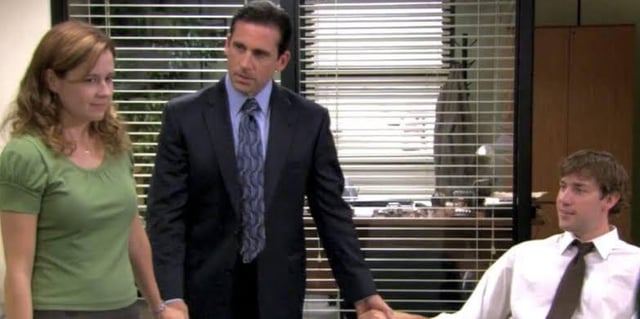
The Office, at its heart, was a show about the mundane magic of everyday life, about finding family in unexpected places, and about the often-awkward pursuit of happiness. Among its beloved ensemble, the journeys of Jim Halpert, Pam Beesly, and Michael Scott stand out as particularly illustrative of different paths to fulfillment. While Jim and Pam's love story unfurled organically within the familiar confines of Dunder Mifflin, culminating in a deeply satisfying, integrated happiness, Michael's lifelong quest for connection, though ultimately finding love, required a profound severance from the "family" he desperately sought, leaving his "happy ending" feeling less complete within the show's narrative.
Jim and Pam's happiness was a slow burn, a testament to the power of shared glances, inside jokes, and unwavering support. Their love story wasn't about escaping Scranton or Dunder Mifflin; it was about transforming it into their world. From the quiet longing in Jim's eyes across the office floor to the legendary "Casino Night" kiss, their relationship bloomed amidst the fluorescent lights and drab cubicles. They navigated the awkwardness of unrequited love, the heartbreak of Pam's engagement to Roy, and the exhilarating triumph of Jim's return from Stamford. Their proposal at the gas station, far from grand, was quintessentially them: understated, real, and bursting with genuine emotion. Their wedding, a chaotic yet beautiful celebration, saw them literally dancing down the aisle, a perfect metaphor for how they embraced life’s imperfections together.
Even when challenges arose, such as Jim's Athleap venture threatening their stability, their resolution was about strengthening their bond within their existing lives. Jim's ultimate sacrifice of his dream, and Pam's unwavering commitment to him, wasn't about compromise as much as it was about prioritizing their family. The emotional video montage Jim created for Pam in the finale, showcasing their entire history, was the ultimate proof: their happiness was anchored in their shared past and built meticulously brick by brick, right there in the office that had witnessed their genesis. They grew together, faced adulthood's complexities hand-in-hand, and ultimately achieved a holistic happiness that felt earned and deeply integrated into the fabric of their lives. Their ending saw them moving to Austin, yes, but it was a move driven by Jim's passion and Pam's support, a collaborative next chapter, not an escape. Their Dunder Mifflin "family" sent them off, validating their journey.
Michael Scott, on the other hand, was a character defined by a profound and often misguided yearning for love and acceptance. His identity was inextricably linked to Dunder Mifflin; he didn't just work there, he lived there, believing his employees were his family, his audience, his children. His desperate attempts at friendship, his inappropriate jokes, his misguided acts of generosity, and his often-lonely existence underscored a deeper need for belonging. Episodes like "Dinner Party," where he forces his colleagues into an excruciating evening, or his poignant monologue about wanting children during "Threat Level Midnight," reveal the raw vulnerability beneath the bravado. He sought a traditional "family" unit with a fierce, almost childlike intensity, but his path was riddled with relational missteps and a fundamental misunderstanding of boundaries.
While Michael finally found his soulmate in Holly Flax – a relationship that truly brought out the best in him, allowing him to be genuinely loved and understood – this profound happiness necessitated his complete departure from Dunder Mifflin. Unlike Jim and Pam, who wove their happiness into their daily lives at the office, Michael's fulfillment was contingent on leaving the only world he had ever truly known and claimed as his own. His farewell episode, "Goodbye, Michael," is a masterclass in bittersweet closure. He walks away from his "children," the office he had presided over for so long, to build a new life in Colorado. While it's clear he achieves the domestic bliss he always craved with Holly, this ending, within the context of the show, feels like a severance rather than a culmination. We don't see Michael integrating this new happiness into the Dunder Mifflin universe; he simply leaves it. His brief, poignant cameo at Dwight's wedding in the finale, a silent confirmation of his enduring love for his friends, reinforces this point: he is a beloved visitor, no longer an active participant in the lives he once dominated.
In essence, Jim and Pam's happy ending was an evolution, a natural blossoming of two individuals growing together within a shared environment. Their story arc was about building a life in Scranton, making it their own. Michael's, however, was a revolution, a necessary exodus to find the love he so desperately craved. He found his personal happiness, but it meant saying goodbye to the "family" he had always tried to create within the office walls. Thus, while both found a form of happiness, Jim and Pam's felt more wholly integrated and witnessed within the show's narrative, a testament to the quiet, enduring power of ordinary love, whereas Michael's, though profoundly personal and fulfilling for him, ultimately felt like a poignant and necessary departure, rather than a full circle moment within the Dunder Mifflin family he so cherished.
@michaelscott.office